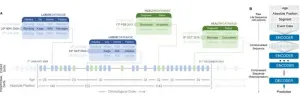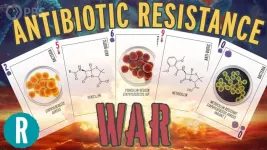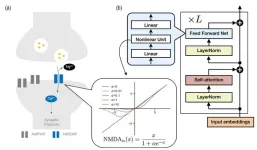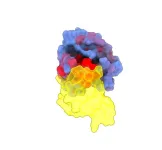(Press-News.org) Artificial intelligence developed to model written language can be utilized to predict events in people's lives. A research project from DTU, University of Copenhagen, ITU, and Northeastern University in the US shows that if you use large amounts of data about people's lives and train so-called 'transformer models', which (like ChatGPT) are used to process language, they can systematically organize the data and predict what will happen in a person's life and even estimate the time of death.
In a new scientific article, 'Using Sequences of Life-events to Predict Human Lives', published in Nature Computational Science, researchers have analyzed health data and attachment to the labour market for 6 million Danes in a model dubbed life2vec. After the model has been trained in an initial phase, i.e., learned the patterns in the data, it has been shown to outperform other advanced neural networks (see fact box) and predict outcomes such as personality and time of death with high accuracy.
"We used the model to address the fundamental question: to what extent can we predict events in your future based on conditions and events in your past? Scientifically, what is exciting for us is not so much the prediction itself, but the aspects of data that enable the model to provide such precise answers," says Sune Lehmann, professor at DTU and first author of the article.
Predictions of time of death
The predictions from Life2vec are answers to general questions such as: 'death within four years'? When the researchers analyze the model's responses, the results are consistent with existing findings within the social sciences; for example, all things being equal, individuals in a leadership position or with a high income are more likely to survive, while being male, skilled or having a mental diagnosis is associated with a higher risk of dying. Life2vec encodes the data in a large system of vectors, a mathematical structure that organizes the different data. The model decides where to place data on the time of birth, schooling, education, salary, housing and health.
"What's exciting is to consider human life as a long sequence of events, similar to how a sentence in a language consists of a series of words. This is usually the type of task for which transformer models in AI are used, but in our experiments we use them to analyze what we call life sequences, i.e., events that have happened in human life," says Sune Lehmann.
Raising ethical questions
The researchers behind the article point out that ethical questions surround the life2vec model, such as protecting sensitive data, privacy, and the role of bias in data. These challenges must be understood more deeply before the model can be used, for example, to assess an individual's risk of contracting a disease or other preventable life events.
"The model opens up important positive and negative perspectives to discuss and address politically. Similar technologies for predicting life events and human behaviour are already used today inside tech companies that, for example, track our behaviour on social networks, profile us extremely accurately, and use these profiles to predict our behaviour and influence us. This discussion needs to be part of the democratic conversation so that we consider where technology is taking us and whether this is a development we want," says Sune Lehmann.
According to the researchers, the next step would be to incorporate other types of information, such as text and images or information about our social connections. This use of data opens up a whole new interaction between social and health sciences.
FACTS:
The research project
The research project 'Using Sequences of Life-events to Predict Human Lives' is based on labour market data and data from the National Patient Registry (LPR) and Statistics Denmark. The dataset includes all 6 million Danes and contains information on income, salary, stipend, job type, industry, social benefits, etc. The health dataset includes records of visits to healthcare professionals or hospitals, diagnosis, patient type and degree of urgency. The dataset spans from 2008 to 2020, but in several analyses, researchers focus on the 2008-2016 period and an age-restricted subset of individuals.
Transformer model
A transformer model is an AI, deep learning data architecture used to learn about language and other tasks. The models can be trained to understand and generate language. The transformer model is designed to be faster and more efficient than previous models and is often used to train large language models on large datasets.
Neural networks
A neural network is a computer model inspired by the brain and nervous system of humans and animals. There are many different types of neural networks (e.g. transformer models). Like the brain, a neural network is made up of artificial neurons. These neurons are connected and can send signals to each other. Each neuron receives input from other neurons and then calculates an output passed on to other neurons. A neural network can learn to solve tasks by training on large amounts of data. Neural networks rely on training data to learn and improve their accuracy over time. But once these learning algorithms are fine-tuned for accuracy, they are potent tools in computer science and artificial intelligence that allow us to classify and group data at high speed. One of the most well-known neural networks is Google's search algorithm. : Neural network - Wikipedia.
END
Artificial intelligence can predict events in people's lives
Artificial intelligence can analyze registry data on people's residence, education, income, health and working conditions and, with high accuracy, predict life events.
2023-12-18
ELSE PRESS RELEASES FROM THIS DATE:
Einstein receives $10.9 million grant to validate remote cognitive testing for Alzheimer’s and other dementias
2023-12-18
December 18, 2023—(BRONX NY)—Neurologists often diagnose Alzheimer’s disease after evaluating patients during lengthy, in-person office visits. This poses a significant challenge for many groups, particularly people with limited access to specialized care, including people from historically marginalized groups and people living in rural areas.
Albert Einstein College of Medicine has received a five-year, $10.9 million grant from the National Institutes of Health (NIH) to study whether remote neuropsychological testing can substitute for in-person office visits when assessing whether people have Alzheimer’s disease or other dementias.
“In-person ...
The antibiotic resistance war (video)
2023-12-18
WASHINGTON, Dec. 18, 2023 — There’s a microscopic battle happening right before our eyes, involving the critical issue of antibiotic resistance. Witness the historical development of antibiotics, from penicillin's accidental discovery to the ongoing battle against superbugs. https://www.youtube.com/watch?v=OCR5wFWSGlA
Reactions is a video series produced by the American Chemical Society and PBS Digital Studios. Subscribe to Reactions at http://bit.ly/ACSReactions and follow us on Twitter @ACSReactions.
The American Chemical Society (ACS) is ...
AI's memory-forming mechanism found to be strikingly similar to that of the brain
2023-12-18
An interdisciplinary team consisting of researchers from the Center for Cognition and Sociality and the Data Science Group within the Institute for Basic Science (IBS) revealed a striking similarity between the memory processing of artificial intelligence (AI) models and the hippocampus of the human brain. This new finding provides a novel perspective on memory consolidation, which is a process that transforms short-term memories into long-term ones, in AI systems.
In the race towards developing ...
15th annual horizon scan identifies 15 most pressing issues for conservation, including invertebrate decline and changing marine ecosystems
2023-12-18
Since 2009, the Cambridge Conservation Initiative has coordinated an annual horizon scan, a well-established method for predicting which threats, changes, and technologies will have the biggest impact on biological conservation in the following year. This year, the 15th horizon scan included 31 scientists, practitioners, and policymakers who developed a list of 96 issues, which they eventually narrowed down to the fifteen most novel and impactful. Their findings, publishing in the journal Trends in Evolution & Ecology ...
Toothbrushing tied to lower rates of pneumonia among hospitalized patients
2023-12-18
Toothbrushing also associated with lower rates of ICU mortality, shorter duration of mechanical ventilation, and shorter ICU length of stay
Researchers say toothbrushing could be a cheap but effective way to help lower rates of hospital-acquired pneumonia
Researchers have found an inexpensive tool that may help reduce rates of pneumonia for hospitalized patients—and it comes with bristles on one end. A new study by investigators from Brigham and Women’s Hospital, a founding member of the Mass General Brigham healthcare system, and Harvard Pilgrim Health Care Institute ...
Ecosystem benefits to humanity expected to decline by 9% by 2100
2023-12-18
As climate change redistributes terrestrial ecosystems across the globe, the world’s natural capital is expected to decrease, causing a 9% loss of ecosystem services by 2100. That’s according to a study of natural capital published today in the journal Nature led by scientists at the University of California, Davis, and Scripps Institution of Oceanography at UC San Diego.
Breathable air, clean water, healthy forests and biodiversity all contribute to people’s well-being in ways that ...
Public benefit programs and differential associations with child maltreatment by race and ethnicity
2023-12-18
About The Study: The results of this study raise concerns that benefit programs may add relative advantages for white children compared with Black and Hispanic children and contribute to racial and ethnic disparities in child protective services investigations. States’ eligibility criteria and distribution practices should be examined to promote equitable effects on adverse child outcomes.
Authors: Henry T. Puls, M.D., of Children’s Mercy Kansas City, is the corresponding author.
To access the embargoed study: Visit our For The Media website ...
Association between daily toothbrushing and hospital-acquired pneumonia
2023-12-18
About The Study: The findings of this systematic review and meta-analysis of 15 randomized clinical trials with an effective population size of 2,786 patients suggest that daily tooth brushing may be associated with significantly lower rates of hospital-acquired pneumonia, particularly in patients receiving mechanical ventilation, lower rates of intensive care unit (ICU) mortality, shorter duration of mechanical ventilation, and shorter ICU length of stay. Policies and programs encouraging more widespread and consistent toothbrushing ...
Secret vulnerabilities of cancer’s ‘death star’ revealed
2023-12-18
Researchers at the Centre for Genomic Regulation in Barcelona, Spain, and the Wellcome Sanger Institute near Cambridge, UK, have comprehensively identified the allosteric control sites found in the protein KRAS. These are highly sought after targets for drug development, representing secret vulnerabilities which can be exploited to control the effects of one of the most important causes of cancer. The study presents the first complete control map for any protein and is published today (18 December) in the journal Nature.
KRAS ...
Toronto study identifies new concepts for GLP-1 action in the brain, the 2023 Science magazine breakthrough of the year
2023-12-18
Research pioneer Dr. Daniel Drucker has much to be proud of, as the GLP-1-based diabetes drugs hailing from his early research are named 2023 breakthrough of the year by the Science Magazine.
Not only have millions of people with type 2 diabetes benefitted from GLP-1 agonists, but the drugs also produced wide-ranging health benefits beyond weight loss in two recent patient trials.
For years, GLP-1 agonists have been known to have a fortuitous side effect of improving metabolic health, but how this is regulated in the body remains unclear. Now Dr. ...
LAST 30 PRESS RELEASES:
Pancreatic cancer may begin hiding from the immune system earlier than we thought
Robotic wing inspired by nature delivers leap in underwater stability
A clinical reveals that aniridia causes a progressive loss of corneal sensitivity
Fossil amber reveals the secret lives of Cretaceous ants
Predicting extreme rainfall through novel spatial modeling
The Lancet: First-ever in-utero stem cell therapy for fetal spina bifida repair is safe, study finds
Nanoplastics can interact with Salmonella to affect food safety, study shows
Eric Moore, M.D., elected to Mayo Clinic Board of Trustees
NYU named “research powerhouse” in new analysis
New polymer materials may offer breakthrough solution for hard-to-remove PFAS in water
Biochar can either curb or boost greenhouse gas emissions depending on soil conditions, new study finds
Nanobiochar emerges as a next generation solution for cleaner water, healthier soils, and resilient ecosystems
Study finds more parents saying ‘No’ to vitamin K, putting babies’ brains at risk
Scientists develop new gut health measure that tracks disease
Rice gene discovery could cut fertiliser use while protecting yields
Jumping ‘DNA parasites’ linked to early stages of tumour formation
Ultra-sensitive CAR T cells provide potential strategy to treat solid tumors
Early Neanderthal-Human interbreeding was strongly sex biased
North American bird declines are widespread and accelerating in agricultural hotspots
Researchers recommend strategies for improved genetic privacy legislation
How birds achieve sweet success
More sensitive cell therapy may be a HIT against solid cancers
Scientists map how aging reshapes cells across the entire mammalian body
Hotspots of accelerated bird decline linked to agricultural activity
How ancient attraction shaped the human genome
NJIT faculty named Senior Members of the National Academy of Inventors
App aids substance use recovery in vulnerable populations
College students nationwide received lifesaving education on sudden cardiac death
Oak Ridge National Laboratory launches the Next-Generation Data Centers Institute
Improved short-term sea level change predictions with better AI training
[Press-News.org] Artificial intelligence can predict events in people's livesArtificial intelligence can analyze registry data on people's residence, education, income, health and working conditions and, with high accuracy, predict life events.









